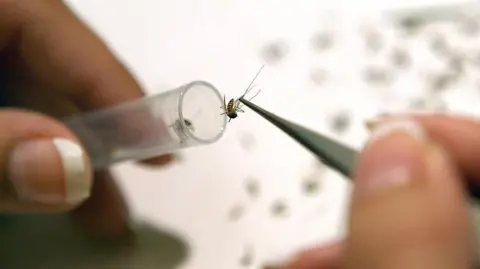Sofia Ferreira Santos
BBC News
Philippa Roxby
Health reporter

 Getty Images
Getty Images
The fragments were found in two samples of Aedes vexans mosquitoes, the health security agency said
West Nile virus has been detected in UK mosquitoes for the first time, UK health officials say.
The risk to the general public is "very low" and although the virus can make people seriously ill in rare cases, there is no evidence it is spreading in the UK, the UK Health Security Agency (UKHSA) added.
West Nile virus, spread via bird-biting mosquitoes, is found in many parts of the world, including mainland Europe.
Climate change and other factors have been pushing mosquitoes - and the diseases they carry - further north in recent years.
To date, there have been no human cases of West Nile virus acquired in the UK - although, since 2000, there have been seven cases of the disease linked to travel to other countries.
West Nile virus is usually present in several regions across the world, including parts of Africa, Asia, South America and Europe, and has expanded in recent years.
Research by the UKHSA and the Animal and Plant Health Agency (APHA) found fragments of the virus in mosquitoes collected at ponds near Retford, Nottinghamshire in 2023.
"While this is the first detection of West Nile Virus in mosquitoes in the UK so far, it is not unexpected as the virus is already widespread in Europe," said Dr Meera Chand, a deputy director for travel health and infections at UKHSA.
Dr Arran Folly, who led the project which found the virus, said its detection is part of a "wider changing landscape, where, in the wake of climate change mosquito-borne diseases are expanding to new areas".
While the Aedes vexans mosquito is native to Britain, he added that warming temperatures may bring non-native species to the UK and, with them, the potential of infectious disease.
West Nile virus causes either very minor symptoms or none at all - but around 20% of infected people can experience headaches, high fever and skin issues. In rare cases, it can kill through serious brain illnesses, including encephalitis or meningitis.
No specific treatment or vaccines exist for humans.
Prof James Logan, from the London School of Hygiene & Tropical Medicine, said the development was "serious" but there was no need for the public to be alarmed.
He said surveillance systems were in place to monitor increased mosquito activity and shifting bird migration caused by warmer weather.
"But as conditions change, we need to stay one step ahead," he said.
"This is a moment to recognise that the UK is no longer immune to some diseases once considered 'tropical'."
Prof Logan said the virus is likely to have arrived via an infected bird or mosquito, which can both travel considerable distances during seasonal migration.
Infected mosquitoes can transmit the virus to humans, he said, but there was "no evidence of human infection acquired in the UK".
"However, the detection of the virus in mosquitoes marks a significant step in that direction," he added.
The affected mosquito, one of many thousands of species of mosquito, is often found in wet areas. Experts recommend getting rid of standing water sources where they breed, and taking personal measures such as using mosquito repellent and bed nets.
Last year, protests were held in Seville, Spain, after the death of five people infected with the disease.

 11 hours ago
7
11 hours ago
7

















































